Reflective Learning: Improving Performance in Higher Education
VerifiedAdded on 2023/06/08
|8
|1755
|170
Essay
AI Summary
This essay delves into the concept of reflective learning, emphasizing its role in enhancing skills and knowledge within higher education, particularly in business management. It explores how reflective learning fosters critical thinking through self-analysis of past experiences and beliefs to improve future performance. The essay focuses on the Gibbs reflective model, detailing its six stages, and examines the significance of feedback and feed-forward mechanisms in refining teaching and learning methodologies. It provides a practical application through a case study, demonstrating how reflective practices can be employed to enhance teamwork and overall academic performance. The essay concludes by highlighting the importance of reflective learning for both students and teachers in optimizing formative and summative assessments and fostering continuous improvement.
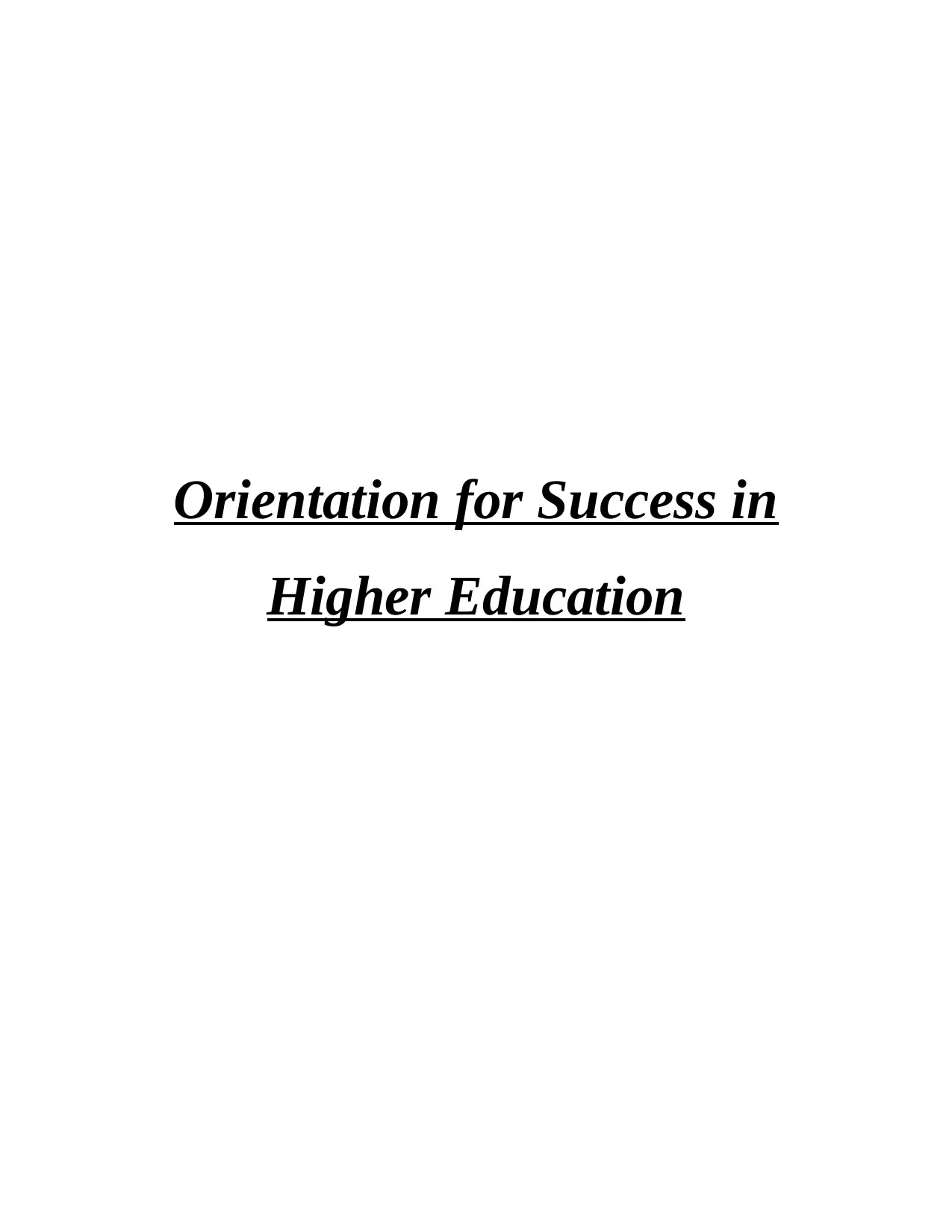
Orientation for Success in
Higher Education
Higher Education
Paraphrase This Document
Need a fresh take? Get an instant paraphrase of this document with our AI Paraphraser
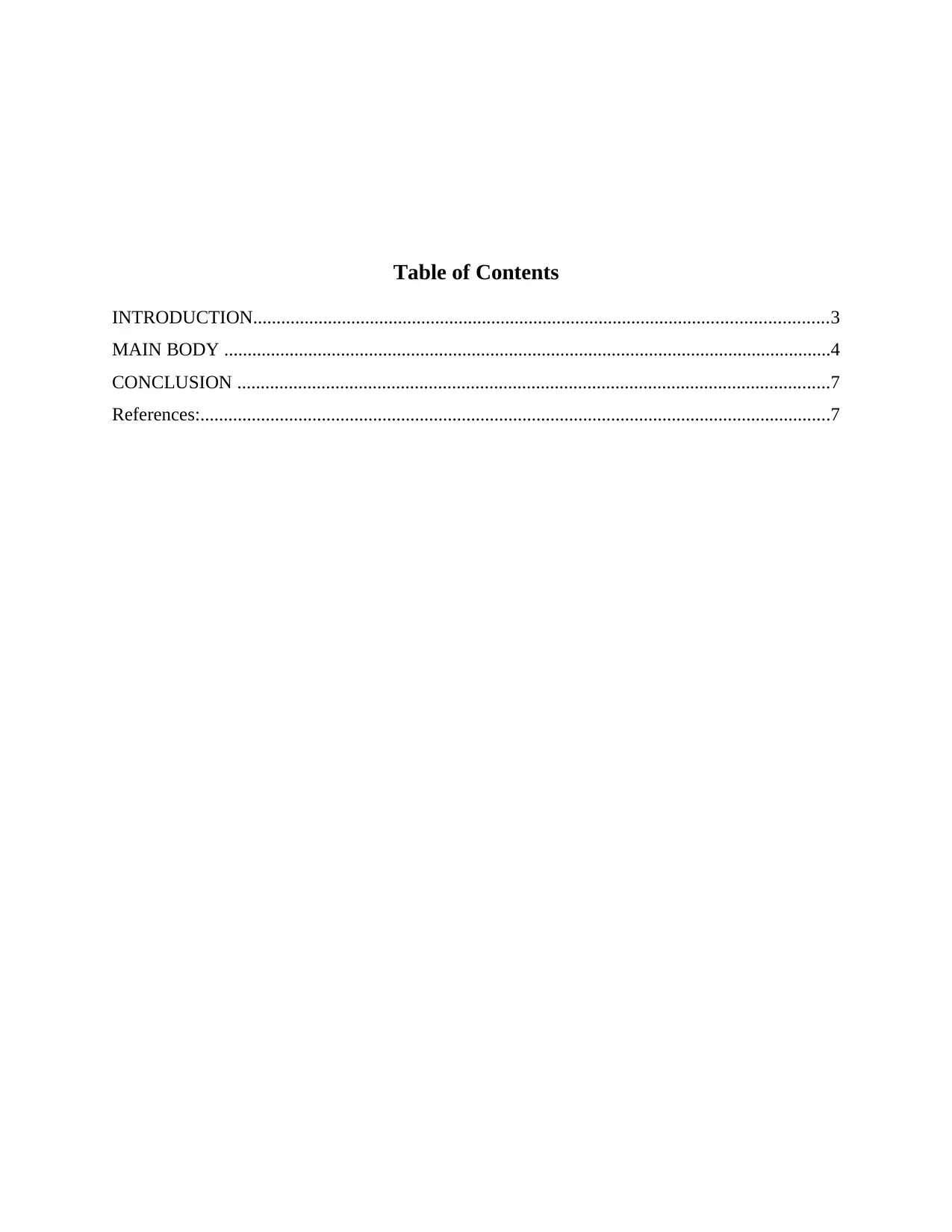
Table of Contents
INTRODUCTION...........................................................................................................................3
MAIN BODY ..................................................................................................................................4
CONCLUSION ...............................................................................................................................7
References:.......................................................................................................................................7
INTRODUCTION...........................................................................................................................3
MAIN BODY ..................................................................................................................................4
CONCLUSION ...............................................................................................................................7
References:.......................................................................................................................................7
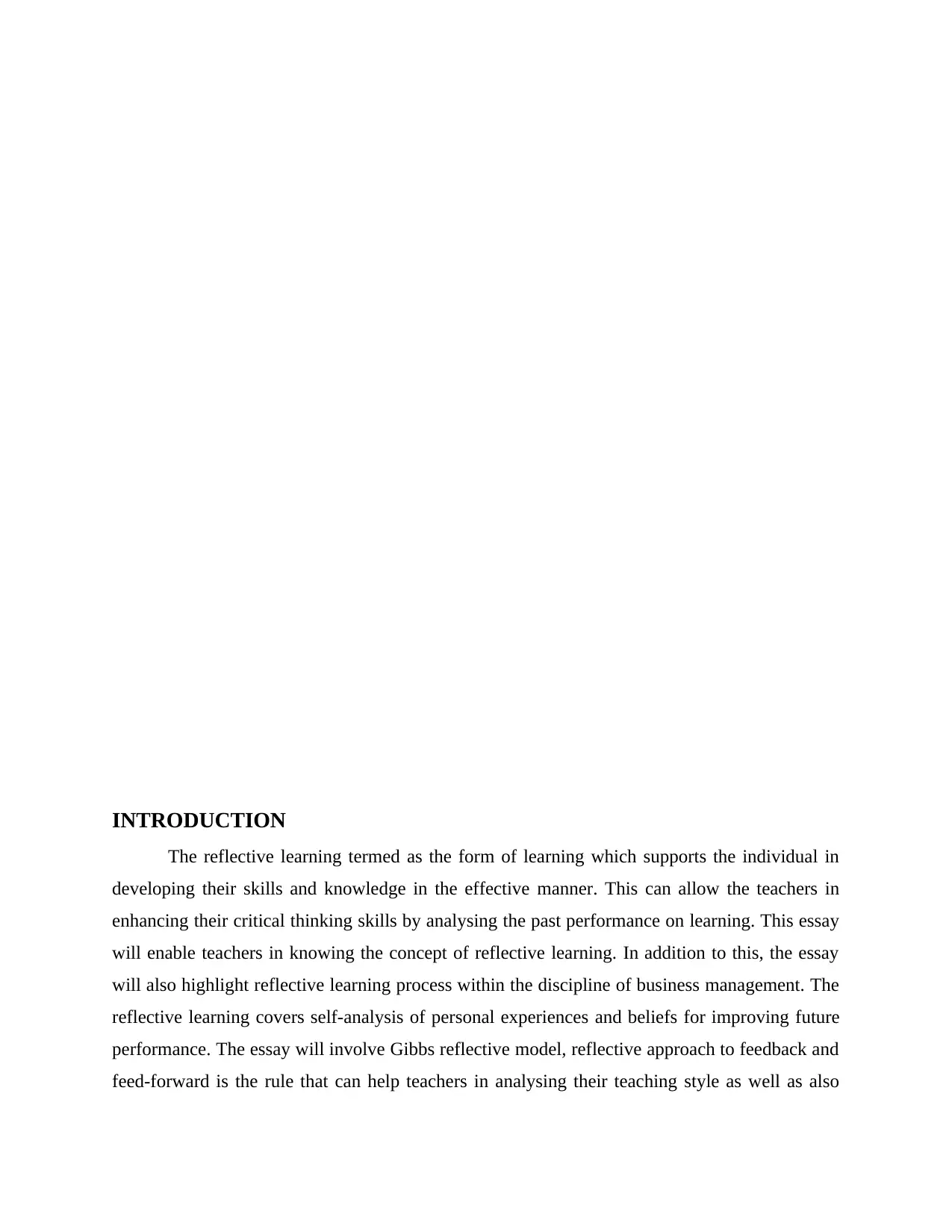
INTRODUCTION
The reflective learning termed as the form of learning which supports the individual in
developing their skills and knowledge in the effective manner. This can allow the teachers in
enhancing their critical thinking skills by analysing the past performance on learning. This essay
will enable teachers in knowing the concept of reflective learning. In addition to this, the essay
will also highlight reflective learning process within the discipline of business management. The
reflective learning covers self-analysis of personal experiences and beliefs for improving future
performance. The essay will involve Gibbs reflective model, reflective approach to feedback and
feed-forward is the rule that can help teachers in analysing their teaching style as well as also
The reflective learning termed as the form of learning which supports the individual in
developing their skills and knowledge in the effective manner. This can allow the teachers in
enhancing their critical thinking skills by analysing the past performance on learning. This essay
will enable teachers in knowing the concept of reflective learning. In addition to this, the essay
will also highlight reflective learning process within the discipline of business management. The
reflective learning covers self-analysis of personal experiences and beliefs for improving future
performance. The essay will involve Gibbs reflective model, reflective approach to feedback and
feed-forward is the rule that can help teachers in analysing their teaching style as well as also
⊘ This is a preview!⊘
Do you want full access?
Subscribe today to unlock all pages.

Trusted by 1+ million students worldwide
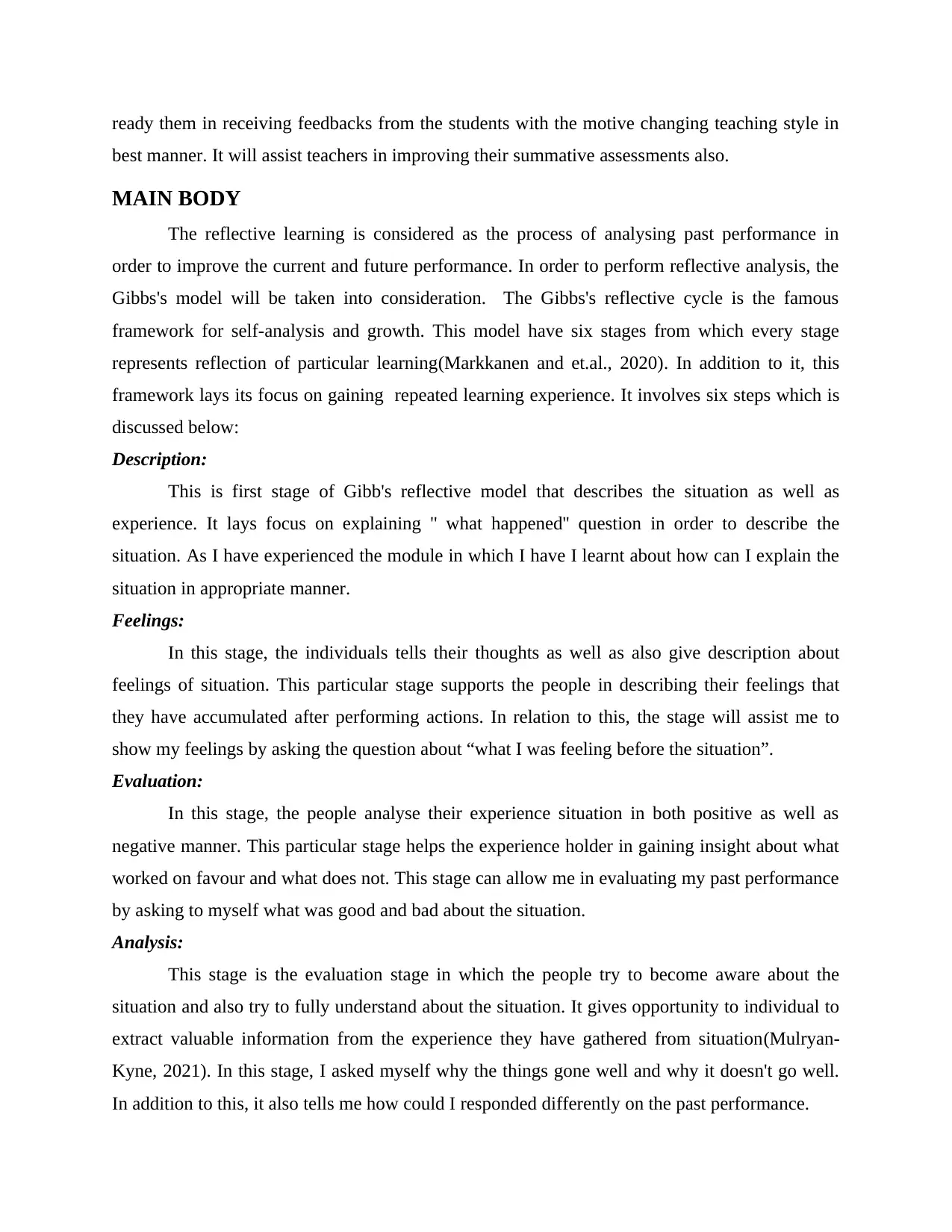
ready them in receiving feedbacks from the students with the motive changing teaching style in
best manner. It will assist teachers in improving their summative assessments also.
MAIN BODY
The reflective learning is considered as the process of analysing past performance in
order to improve the current and future performance. In order to perform reflective analysis, the
Gibbs's model will be taken into consideration. The Gibbs's reflective cycle is the famous
framework for self-analysis and growth. This model have six stages from which every stage
represents reflection of particular learning(Markkanen and et.al., 2020). In addition to it, this
framework lays its focus on gaining repeated learning experience. It involves six steps which is
discussed below:
Description:
This is first stage of Gibb's reflective model that describes the situation as well as
experience. It lays focus on explaining '' what happened'' question in order to describe the
situation. As I have experienced the module in which I have I learnt about how can I explain the
situation in appropriate manner.
Feelings:
In this stage, the individuals tells their thoughts as well as also give description about
feelings of situation. This particular stage supports the people in describing their feelings that
they have accumulated after performing actions. In relation to this, the stage will assist me to
show my feelings by asking the question about “what I was feeling before the situation”.
Evaluation:
In this stage, the people analyse their experience situation in both positive as well as
negative manner. This particular stage helps the experience holder in gaining insight about what
worked on favour and what does not. This stage can allow me in evaluating my past performance
by asking to myself what was good and bad about the situation.
Analysis:
This stage is the evaluation stage in which the people try to become aware about the
situation and also try to fully understand about the situation. It gives opportunity to individual to
extract valuable information from the experience they have gathered from situation(Mulryan-
Kyne, 2021). In this stage, I asked myself why the things gone well and why it doesn't go well.
In addition to this, it also tells me how could I responded differently on the past performance.
best manner. It will assist teachers in improving their summative assessments also.
MAIN BODY
The reflective learning is considered as the process of analysing past performance in
order to improve the current and future performance. In order to perform reflective analysis, the
Gibbs's model will be taken into consideration. The Gibbs's reflective cycle is the famous
framework for self-analysis and growth. This model have six stages from which every stage
represents reflection of particular learning(Markkanen and et.al., 2020). In addition to it, this
framework lays its focus on gaining repeated learning experience. It involves six steps which is
discussed below:
Description:
This is first stage of Gibb's reflective model that describes the situation as well as
experience. It lays focus on explaining '' what happened'' question in order to describe the
situation. As I have experienced the module in which I have I learnt about how can I explain the
situation in appropriate manner.
Feelings:
In this stage, the individuals tells their thoughts as well as also give description about
feelings of situation. This particular stage supports the people in describing their feelings that
they have accumulated after performing actions. In relation to this, the stage will assist me to
show my feelings by asking the question about “what I was feeling before the situation”.
Evaluation:
In this stage, the people analyse their experience situation in both positive as well as
negative manner. This particular stage helps the experience holder in gaining insight about what
worked on favour and what does not. This stage can allow me in evaluating my past performance
by asking to myself what was good and bad about the situation.
Analysis:
This stage is the evaluation stage in which the people try to become aware about the
situation and also try to fully understand about the situation. It gives opportunity to individual to
extract valuable information from the experience they have gathered from situation(Mulryan-
Kyne, 2021). In this stage, I asked myself why the things gone well and why it doesn't go well.
In addition to this, it also tells me how could I responded differently on the past performance.
Paraphrase This Document
Need a fresh take? Get an instant paraphrase of this document with our AI Paraphraser
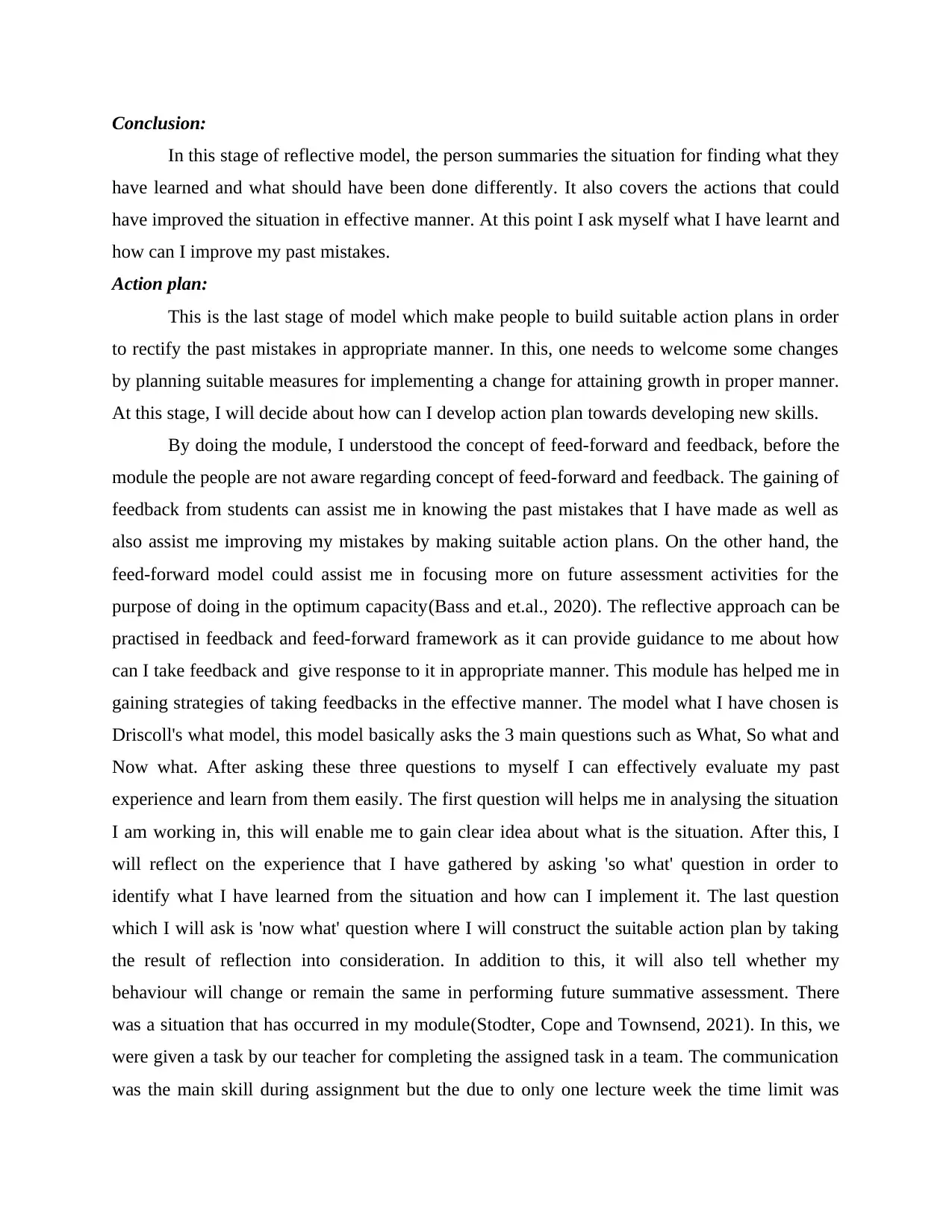
Conclusion:
In this stage of reflective model, the person summaries the situation for finding what they
have learned and what should have been done differently. It also covers the actions that could
have improved the situation in effective manner. At this point I ask myself what I have learnt and
how can I improve my past mistakes.
Action plan:
This is the last stage of model which make people to build suitable action plans in order
to rectify the past mistakes in appropriate manner. In this, one needs to welcome some changes
by planning suitable measures for implementing a change for attaining growth in proper manner.
At this stage, I will decide about how can I develop action plan towards developing new skills.
By doing the module, I understood the concept of feed-forward and feedback, before the
module the people are not aware regarding concept of feed-forward and feedback. The gaining of
feedback from students can assist me in knowing the past mistakes that I have made as well as
also assist me improving my mistakes by making suitable action plans. On the other hand, the
feed-forward model could assist me in focusing more on future assessment activities for the
purpose of doing in the optimum capacity(Bass and et.al., 2020). The reflective approach can be
practised in feedback and feed-forward framework as it can provide guidance to me about how
can I take feedback and give response to it in appropriate manner. This module has helped me in
gaining strategies of taking feedbacks in the effective manner. The model what I have chosen is
Driscoll's what model, this model basically asks the 3 main questions such as What, So what and
Now what. After asking these three questions to myself I can effectively evaluate my past
experience and learn from them easily. The first question will helps me in analysing the situation
I am working in, this will enable me to gain clear idea about what is the situation. After this, I
will reflect on the experience that I have gathered by asking 'so what' question in order to
identify what I have learned from the situation and how can I implement it. The last question
which I will ask is 'now what' question where I will construct the suitable action plan by taking
the result of reflection into consideration. In addition to this, it will also tell whether my
behaviour will change or remain the same in performing future summative assessment. There
was a situation that has occurred in my module(Stodter, Cope and Townsend, 2021). In this, we
were given a task by our teacher for completing the assigned task in a team. The communication
was the main skill during assignment but the due to only one lecture week the time limit was
In this stage of reflective model, the person summaries the situation for finding what they
have learned and what should have been done differently. It also covers the actions that could
have improved the situation in effective manner. At this point I ask myself what I have learnt and
how can I improve my past mistakes.
Action plan:
This is the last stage of model which make people to build suitable action plans in order
to rectify the past mistakes in appropriate manner. In this, one needs to welcome some changes
by planning suitable measures for implementing a change for attaining growth in proper manner.
At this stage, I will decide about how can I develop action plan towards developing new skills.
By doing the module, I understood the concept of feed-forward and feedback, before the
module the people are not aware regarding concept of feed-forward and feedback. The gaining of
feedback from students can assist me in knowing the past mistakes that I have made as well as
also assist me improving my mistakes by making suitable action plans. On the other hand, the
feed-forward model could assist me in focusing more on future assessment activities for the
purpose of doing in the optimum capacity(Bass and et.al., 2020). The reflective approach can be
practised in feedback and feed-forward framework as it can provide guidance to me about how
can I take feedback and give response to it in appropriate manner. This module has helped me in
gaining strategies of taking feedbacks in the effective manner. The model what I have chosen is
Driscoll's what model, this model basically asks the 3 main questions such as What, So what and
Now what. After asking these three questions to myself I can effectively evaluate my past
experience and learn from them easily. The first question will helps me in analysing the situation
I am working in, this will enable me to gain clear idea about what is the situation. After this, I
will reflect on the experience that I have gathered by asking 'so what' question in order to
identify what I have learned from the situation and how can I implement it. The last question
which I will ask is 'now what' question where I will construct the suitable action plan by taking
the result of reflection into consideration. In addition to this, it will also tell whether my
behaviour will change or remain the same in performing future summative assessment. There
was a situation that has occurred in my module(Stodter, Cope and Townsend, 2021). In this, we
were given a task by our teacher for completing the assigned task in a team. The communication
was the main skill during assignment but the due to only one lecture week the time limit was
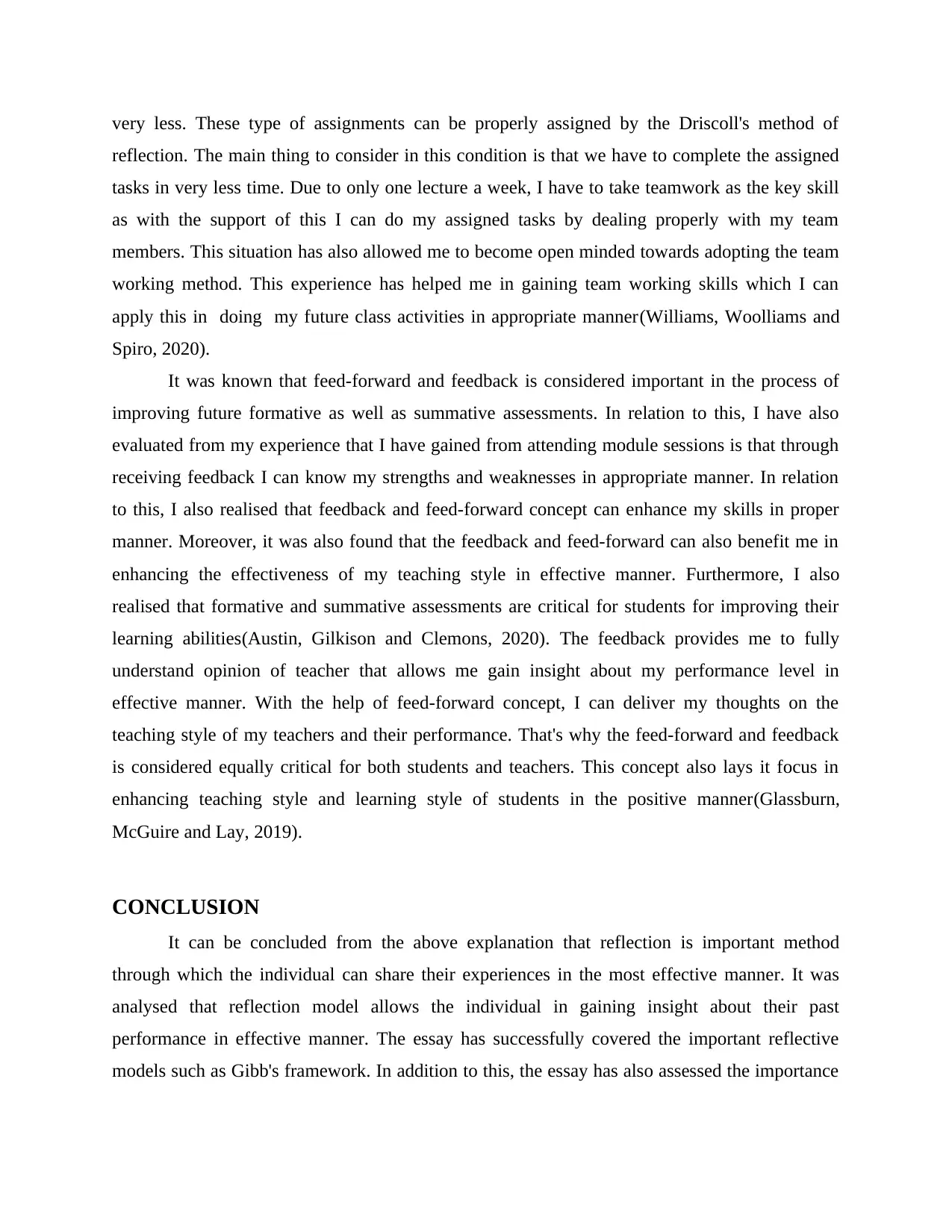
very less. These type of assignments can be properly assigned by the Driscoll's method of
reflection. The main thing to consider in this condition is that we have to complete the assigned
tasks in very less time. Due to only one lecture a week, I have to take teamwork as the key skill
as with the support of this I can do my assigned tasks by dealing properly with my team
members. This situation has also allowed me to become open minded towards adopting the team
working method. This experience has helped me in gaining team working skills which I can
apply this in doing my future class activities in appropriate manner(Williams, Woolliams and
Spiro, 2020).
It was known that feed-forward and feedback is considered important in the process of
improving future formative as well as summative assessments. In relation to this, I have also
evaluated from my experience that I have gained from attending module sessions is that through
receiving feedback I can know my strengths and weaknesses in appropriate manner. In relation
to this, I also realised that feedback and feed-forward concept can enhance my skills in proper
manner. Moreover, it was also found that the feedback and feed-forward can also benefit me in
enhancing the effectiveness of my teaching style in effective manner. Furthermore, I also
realised that formative and summative assessments are critical for students for improving their
learning abilities(Austin, Gilkison and Clemons, 2020). The feedback provides me to fully
understand opinion of teacher that allows me gain insight about my performance level in
effective manner. With the help of feed-forward concept, I can deliver my thoughts on the
teaching style of my teachers and their performance. That's why the feed-forward and feedback
is considered equally critical for both students and teachers. This concept also lays it focus in
enhancing teaching style and learning style of students in the positive manner(Glassburn,
McGuire and Lay, 2019).
CONCLUSION
It can be concluded from the above explanation that reflection is important method
through which the individual can share their experiences in the most effective manner. It was
analysed that reflection model allows the individual in gaining insight about their past
performance in effective manner. The essay has successfully covered the important reflective
models such as Gibb's framework. In addition to this, the essay has also assessed the importance
reflection. The main thing to consider in this condition is that we have to complete the assigned
tasks in very less time. Due to only one lecture a week, I have to take teamwork as the key skill
as with the support of this I can do my assigned tasks by dealing properly with my team
members. This situation has also allowed me to become open minded towards adopting the team
working method. This experience has helped me in gaining team working skills which I can
apply this in doing my future class activities in appropriate manner(Williams, Woolliams and
Spiro, 2020).
It was known that feed-forward and feedback is considered important in the process of
improving future formative as well as summative assessments. In relation to this, I have also
evaluated from my experience that I have gained from attending module sessions is that through
receiving feedback I can know my strengths and weaknesses in appropriate manner. In relation
to this, I also realised that feedback and feed-forward concept can enhance my skills in proper
manner. Moreover, it was also found that the feedback and feed-forward can also benefit me in
enhancing the effectiveness of my teaching style in effective manner. Furthermore, I also
realised that formative and summative assessments are critical for students for improving their
learning abilities(Austin, Gilkison and Clemons, 2020). The feedback provides me to fully
understand opinion of teacher that allows me gain insight about my performance level in
effective manner. With the help of feed-forward concept, I can deliver my thoughts on the
teaching style of my teachers and their performance. That's why the feed-forward and feedback
is considered equally critical for both students and teachers. This concept also lays it focus in
enhancing teaching style and learning style of students in the positive manner(Glassburn,
McGuire and Lay, 2019).
CONCLUSION
It can be concluded from the above explanation that reflection is important method
through which the individual can share their experiences in the most effective manner. It was
analysed that reflection model allows the individual in gaining insight about their past
performance in effective manner. The essay has successfully covered the important reflective
models such as Gibb's framework. In addition to this, the essay has also assessed the importance
⊘ This is a preview!⊘
Do you want full access?
Subscribe today to unlock all pages.

Trusted by 1+ million students worldwide
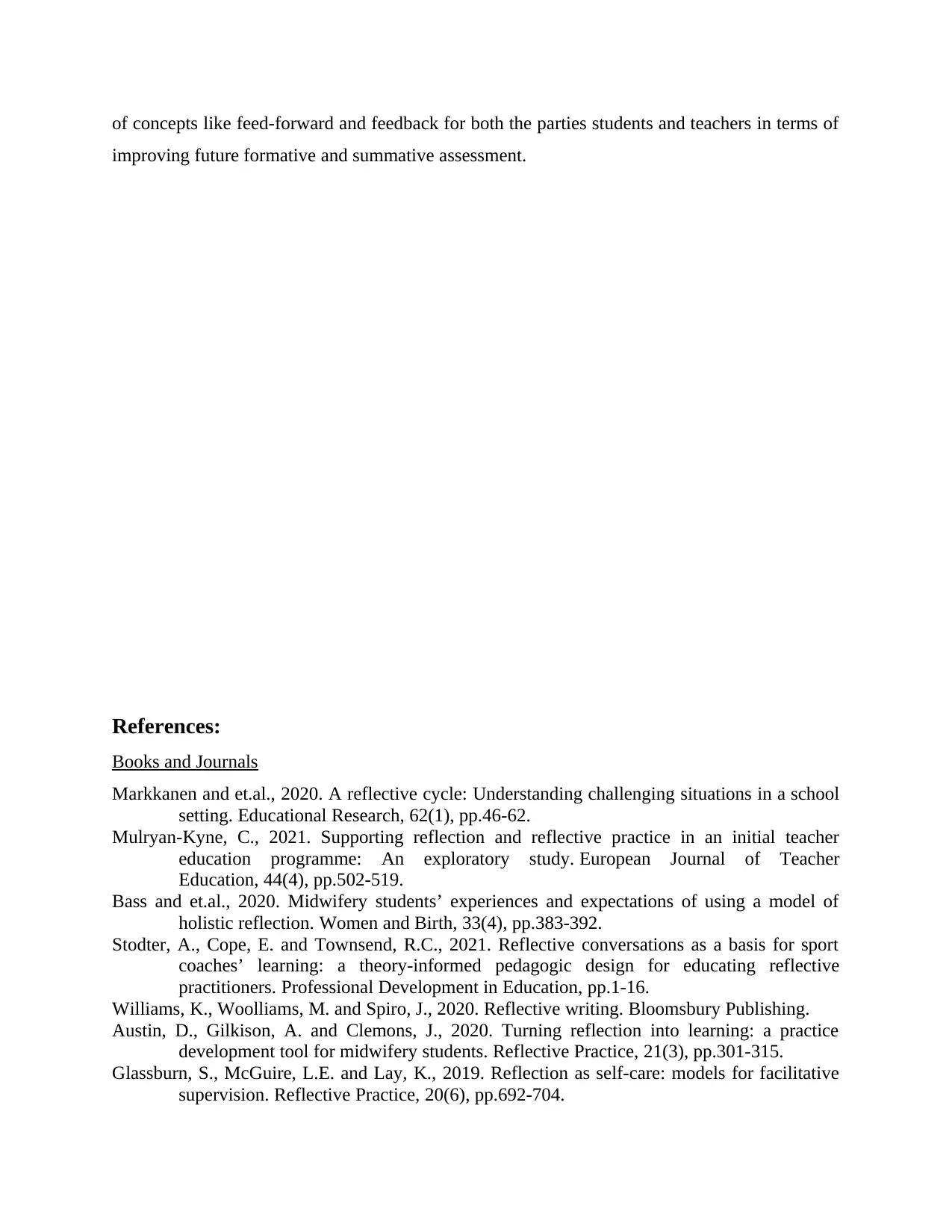
of concepts like feed-forward and feedback for both the parties students and teachers in terms of
improving future formative and summative assessment.
References:
Books and Journals
Markkanen and et.al., 2020. A reflective cycle: Understanding challenging situations in a school
setting. Educational Research, 62(1), pp.46-62.
Mulryan-Kyne, C., 2021. Supporting reflection and reflective practice in an initial teacher
education programme: An exploratory study. European Journal of Teacher
Education, 44(4), pp.502-519.
Bass and et.al., 2020. Midwifery students’ experiences and expectations of using a model of
holistic reflection. Women and Birth, 33(4), pp.383-392.
Stodter, A., Cope, E. and Townsend, R.C., 2021. Reflective conversations as a basis for sport
coaches’ learning: a theory-informed pedagogic design for educating reflective
practitioners. Professional Development in Education, pp.1-16.
Williams, K., Woolliams, M. and Spiro, J., 2020. Reflective writing. Bloomsbury Publishing.
Austin, D., Gilkison, A. and Clemons, J., 2020. Turning reflection into learning: a practice
development tool for midwifery students. Reflective Practice, 21(3), pp.301-315.
Glassburn, S., McGuire, L.E. and Lay, K., 2019. Reflection as self-care: models for facilitative
supervision. Reflective Practice, 20(6), pp.692-704.
improving future formative and summative assessment.
References:
Books and Journals
Markkanen and et.al., 2020. A reflective cycle: Understanding challenging situations in a school
setting. Educational Research, 62(1), pp.46-62.
Mulryan-Kyne, C., 2021. Supporting reflection and reflective practice in an initial teacher
education programme: An exploratory study. European Journal of Teacher
Education, 44(4), pp.502-519.
Bass and et.al., 2020. Midwifery students’ experiences and expectations of using a model of
holistic reflection. Women and Birth, 33(4), pp.383-392.
Stodter, A., Cope, E. and Townsend, R.C., 2021. Reflective conversations as a basis for sport
coaches’ learning: a theory-informed pedagogic design for educating reflective
practitioners. Professional Development in Education, pp.1-16.
Williams, K., Woolliams, M. and Spiro, J., 2020. Reflective writing. Bloomsbury Publishing.
Austin, D., Gilkison, A. and Clemons, J., 2020. Turning reflection into learning: a practice
development tool for midwifery students. Reflective Practice, 21(3), pp.301-315.
Glassburn, S., McGuire, L.E. and Lay, K., 2019. Reflection as self-care: models for facilitative
supervision. Reflective Practice, 20(6), pp.692-704.
Paraphrase This Document
Need a fresh take? Get an instant paraphrase of this document with our AI Paraphraser

1 out of 8
Related Documents
Your All-in-One AI-Powered Toolkit for Academic Success.
+13062052269
info@desklib.com
Available 24*7 on WhatsApp / Email
![[object Object]](/_next/static/media/star-bottom.7253800d.svg)
Unlock your academic potential
Copyright © 2020–2026 A2Z Services. All Rights Reserved. Developed and managed by ZUCOL.


